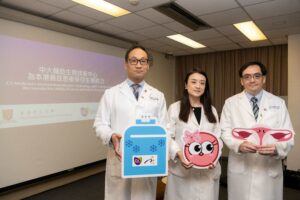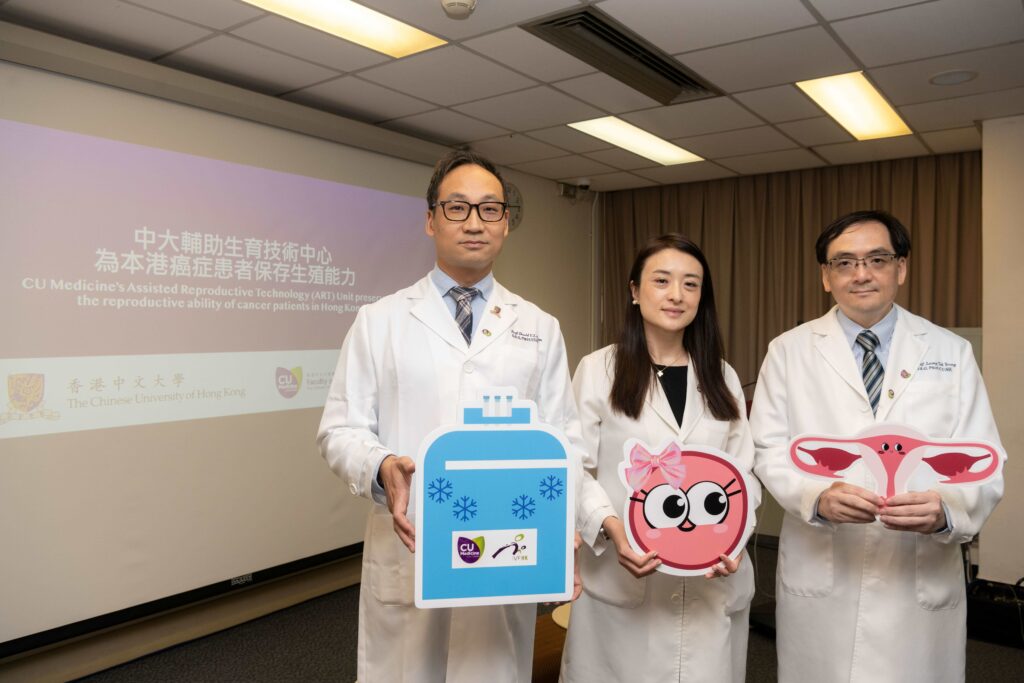CUHK
News Centre
CU Medicine’s Assisted Reproductive Technology (ART) Unit preserves the reproductive ability of cancer patients in Hong Kong
The Assisted Reproductive Technology Unit (ART Unit) of the Department of Obstetrics and Gynaecology at The Chinese University of Hong Kong (CUHK)’s Faculty of Medicine (CU Medicine) is a leader in preserving reproductive ability. In recent years, the ART Unit has achieved significant technological breakthroughs in the field. Through ovarian tissue cryopreservation, the ART Unit helps female cancer patients who may become infertile due to chemotherapy or radiation therapy. Before cancer treatment, small pieces of ovarian tissue from the patient are collected and frozen for preservation, which can help retain their reproductive ability.
Protecting patients with damaged reproductive ability due to gonadotoxic treatment
With advancing assisted reproductive technology, more young cancer patients can consider having children. Drugs, diseases, chemotherapy and radiotherapy can damage important reproductive organs, including ovaries and testes. Reproductive preservation technology aims to protect patients with damaged reproductive ability due to gonadotoxic drug therapy. Men, women and married couples can preserve their reproductive ability by freezing sperm, eggs and embryos respectively, so that they can have children in the future (see appendix for details).
Since the 1990s, the ART Unit has been providing embryo and sperm freezing services for cancer patients. In 2016, frozen egg storage services started being offered to single female cancer patients. However, freezing embryos and eggs stimulates the ovaries, and the procedures take time. Cancer treatment may be delayed, and the patient’s condition affected. Patients’ hormone levels may also temporarily increase, which may lead to the recurrence of cancer in hormone-sensitive cancers.
Ovarian tissue cryopreservation and ovarian tissue transplantation
In recent years, the ART Unit has made significant progress in the field of preserving reproductive ability. Through ovarian tissue cryopreservation, it helps women who may become infertile due to chemotherapy or radiation therapy. Before cancer treatment, small pieces of ovarian tissue from the patient are removed and frozen for preservation. Dr Jacqueline Chung Pui-wah, Associate Professor in the Department of Obstetrics and Gynaecology at CU Medicine, stated, “This method is especially suitable for adolescent girls who need immediate cancer treatment and do not have enough time for ovarian stimulation. It also brings hope for young female patients who cannot undergo ovarian stimulation, including pre-adolescent girls and young women whose conditions do not allow them to receive hormone stimulation.”
The team previously conducted a study on laboratory mice, which demonstrated that ovarian tissue could survive freezing and transplantation. The researchers were still able to observe primordial follicles in the thawed and transplanted ovarian tissue. Professor David Chan Yiu-leung, Assistant Professor in the Department of Obstetrics and Gynaecology at CU Medicine, pointed out, “The results of this mouse study provide scientific evidence and an important reference for the clinical implementation of ovarian tissue cryopreservation and subsequent ovarian tissue transplantation in Hong Kong. Another option is available for female patients who need cancer treatment and cannot have their eggs frozen.”
Professor Leung Tak-yeung, Professor in the Department of Obstetrics and Gynaecology at CU Medicine, concluded, “This breakthrough in fertility preservation is a result of the dedication and hard work of the experts in our team. Our unit is committed to advancing fertility preservation and will continue to provide the highest level of care to our patients.”
For more information about fertility preservation, please contact the ART Unit at 3505 1456 or visit its website https://www.ivfhk.com/?lang=zh-hant.

In recent years, the Assisted Reproductive Technology Unit (ART Unit) of the Department of Obstetrics and Gynaecology at CU Medicine has achieved significant technological breakthroughs in the field of reproductive ability preservation. Through ovarian tissue cryopreservation, small pieces of ovarian tissue from cancer patients are collected and frozen for preservation before cancer treatment, which can help retain their reproductive ability.
Featured in the photo are the members from the ART Unit, including (from left) Professor David Chan Yiu-leung, Assistant Professor; Dr Jacqueline Chung Pui-wah, Associate Professor; and Professor Leung Tak-yeung, from the Department of Obstetrics and Gynaecology at CU Medicine.


